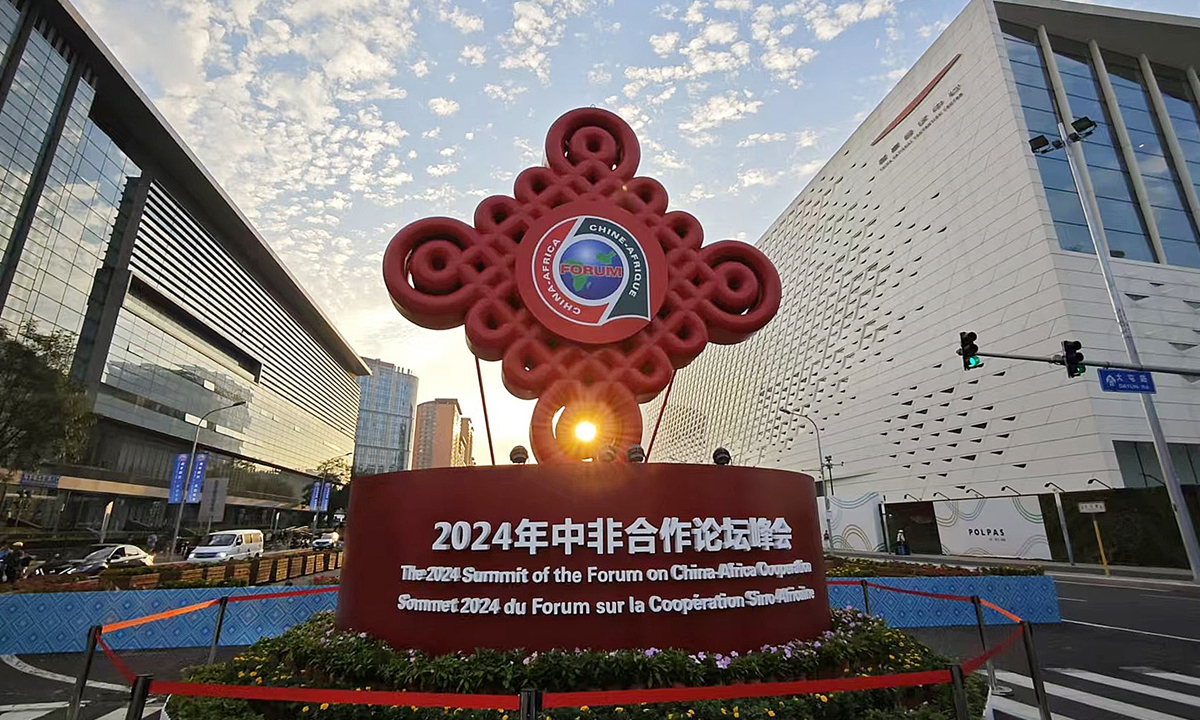FOCAC boosts Africa's development, propping up African infrastructure, green energy sector: Egyptian scholar

A decoration for the 2024 Summit of Forum on China-Africa Cooperation (FOCAC) is seen on display near the China National Convention Center in Beijing on August 30, 2024. This year's FOCAC will be held in Beijing from September 4 to 6. Photo: VCG
The 2024 Summit of the Forum on China-Africa Cooperation (FOCAC), to be held in Beijing from Wednesday to Friday, will help accelerate economic development in Africa, especially infrastructure projects and the new-energy sector cooperation, an Egyptian scholar told the Global Times in a recent interview.In response to global economic challenges and geopolitical conflicts, FOCAC aims to "forge a new and hopeful outlook for China-Africa cooperation, aligning with the Global South against past injustices and seeking to counter hegemonic systems", Ahmed Abdellah Faris, a researcher in Israeli studies and international relations at the Center for Arab-Eurasian Studies and the Secretary General of the Association of African and Arab Journalists in the Egyptian Journalists Syndicate told the Global Times on Monday.
Faris said that the discussion will concentrate on the high-quality joint construction of the Belt and Road Initiative (BRI) and the integration of the BRI with Africa's Agenda 2063.
The summit will highlight China's adaptable approach toward genuine partnerships with African nations, contributing significantly to Africa's development agendas, particularly in infrastructure, Faris noted.
This includes major investments in projects like the high-speed rail network linking Africa's capital cities. "China's role extends to financing substantial railway and renewable energy initiatives, furthering environmental conservation across the continent," he said.
The forum is set to boost Africa's development momentum, drawing investment and renewable energy projects as nations look to align with Chinese initiatives, Faris said.
Faris emphasized that the forum will spotlight the importance of steadily improving African infrastructure and ports, deemed crucial for boosting the continent's exports and helping African nations integrate more deeply into the global economy.
Through cooperation, China's advanced technology in telecommunications, transportation, and high-standard manufacturing could help Africa utilize its resources more efficiently and sustainably, he said.
The summit will showcase China's commitment to mitigating global climate change through its leadership in developing renewable green technology." This includes transferring clean energy technologies to Africa, positioning the continent as a vital hub for sustainable development that benefits the global community and spurs worldwide clean energy investments," Faris said.
And, China's collaboration with Africa could significantly boost global multipolarity over the coming decade, he added.
Historically, China has supported Africa's renewable energy sector development, investing in projects like wind and solar power exploration. The support extends to the China-Africa Cooperation on Renewable Energy Technology Innovation and Application, addressing the continent's energy shortages, he said.
Faris noted that, Egypt, his homeland, has significantly benefited from closer cooperation with China, especially in infrastructure projects.
He highlighted that Egypt is actively adopting China's development strategies, including infrastructure advancements and investing in high-speed rail projects, in order to attract investments and enhance industry diversification.
Faris highlighted China's commitment to a development and cooperation path that is benefiting all, steering clear of hegemony. He noted China's collaboration with the developing nations helps promote stability and peace, countering the efforts by the US and its allies to maintain hegemony.
He called for a cooperative, inclusive global development, affirming that a shared future for humanity is the best path forward for the world.
